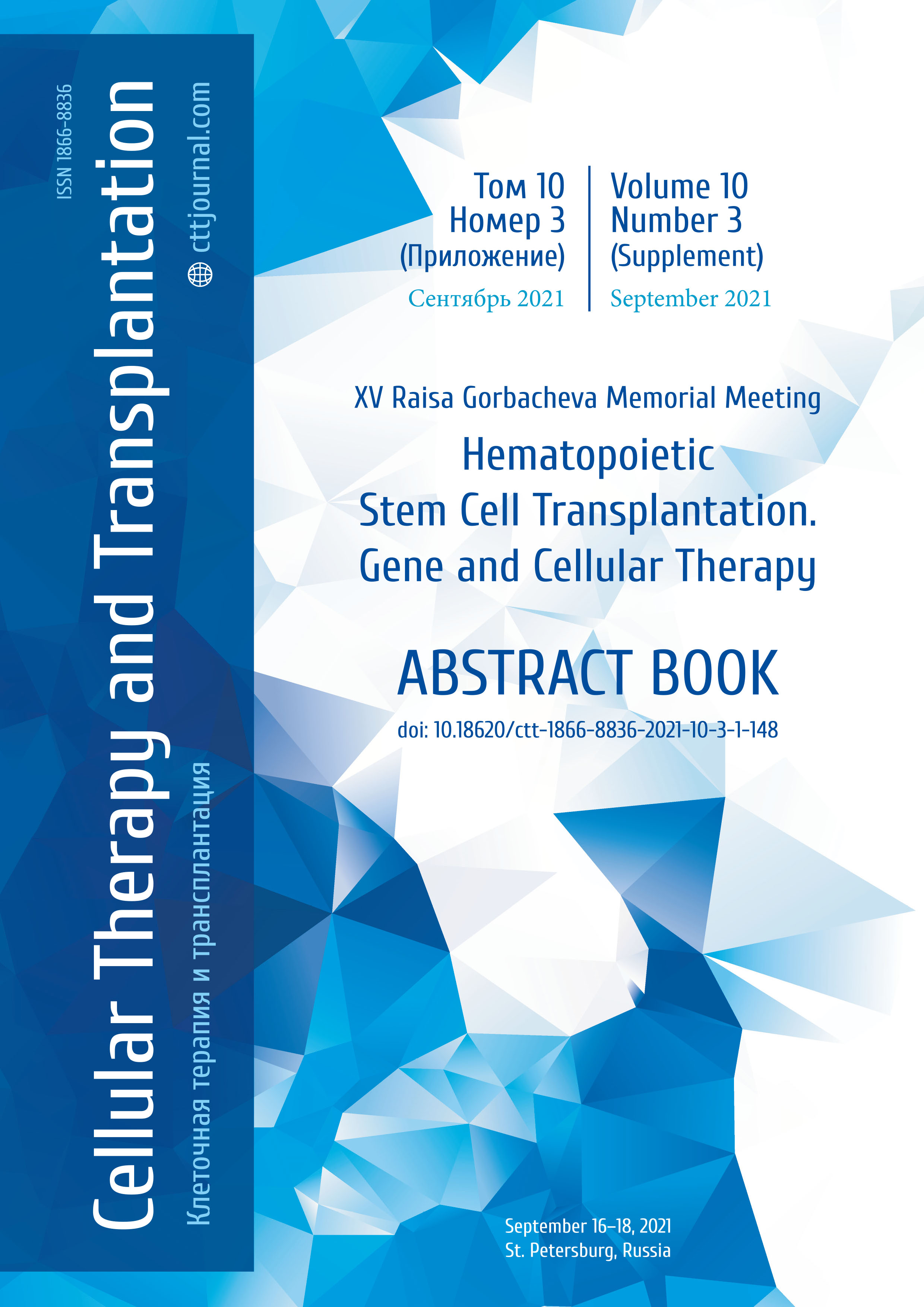AL-03. Gilteritinib in relapsed or refractory acute myeloid leukemia FLT3+ in adult patients
Sergey N. Bondarenko1, Elena V. Morozova1, Anna G. Smirnova1, Yulia Yu. Vlasova1, Bella I. Ayubova1, Elena V. Karyagina2, Ridvan K. Ilyasov3, Natalya A. Zorina4, Svetlana S. Belyaeva5, Yulia S. Neredko6, Irina A. Samorodova7, Yulia B. Chernih8, Mikhail Yu. Lazarev9, Anna P. Kochergina10, Nikolai Yu. Tcvetkov1, Mikhail M. Kanunnikov1, Yulia D. Oleynikova1, Dmitry K. Zhogolev1, Ildar M. Barkhatov1, Tatiana L. Gindina1, Ivan S. Moiseev1, Alexander D. Kulagin1
1 RM Gorbacheva Research Institute, Pavlov University, St. Petersburg, Russia
2 City Hospital No. 15 of St. Petersburg, Russia
3 Crimean Republican Oncological Clinical Dispensary named after V. М. Efetov, Simferopol, Russia
4 Kirov Research Institute of Hematology and Blood Transfusion, Kirov, Russia
5 Belgorod Regional Clinical Hospital of St. Joasaph, Belgorod, Russia
6 Stavropol Regional Clinical Oncological Dispensary, Stavropol, Russia
7 City Hospital No. 31 of St. Petersburg, Russia
8 Moscow M. F. Vladimirsky Regional Research Clinical Institute, Moscow, Russia
9 City Clinical Hospital No. 40, Moscow, Russia
10 Regional Clinical Hospital, Barnaul, Russia
Correspondence:
Dr. Sergey N. Bondarenko, phone: +7 (921) 994-35-70, e-mail: dr.sergeybondarenko@gmail.com
Summary
About 20-30% of adult patients with acute myeloid leukemia (AML) have FMS-like tyrosine kinase 3 (FLT3) gene mutations. These mutations are most commonly observed and have prognostic significance in patients with normal karyotype. If relapse (Rel) occurs, remissions are rarely achieved with chemotherapy and are usually very short. FDA approved a second-generation FLT3-inhibitor gilteritinib (Gilt) for the treatment of relapsed and refractory (r/r) AML FLT3+ in 2018. Our aim was to evaluate the efficacy and safety of FLT3 kinase inhibitors in r/r AML before allogeneic hematopoietic stem cell transplantation (allo-HSCT).
Patients and methods
The study included 47 patients (the median age 50 (18-79) years) with r/r AML who received Gilt monotherapy at a dose of 120 mg/d. Median follow-up was 6 (0,5-26) months. FLT3-ITD mutation was detected in 42 (89%), FLT3-TKD mutation in 4 (89%), (Leu601del)(Lys602Arg) in 1 (2%) patient. Additionally, NPM1 and KMT2A were detected in 9 and 1, WT1 and BAALC overexpression in 18 and 2 patients, respectively. The intermediate prognostic group ELN2017 (PG-ELN2017) included 34 (72%) patients, 23 of them with normal karyotype. The unfavorable group included 13 (28%) pts, 4 of them with a complex karyotype, 5 with t(6;9)(p23;q34). Fifteen (32%), 25 (53%) and 7 (15%) pts had primary resistance (PrRes), Rel1 and Rel≥2, respectively. Allo-HSCT was performed after Gilt therapy in 11 (46%) pts in complete remission (CR)/ CR with incomplete hematological recovery (nCR). The median duration of therapy was 5 (1-18) cycles.
Results
Overall (OS) and event-free (EFS) survival were 27% (95% CI, 9-45) and 22% (95% CI, 1-43). CR was achieved in 13 (28%), nCR in 11 (23%) pts. An overall response rate (ORR) was 51% (24/47). All but two pts who achieved CR responded to the first cycle. Four pts achieved nCR after the first and 5 pts after the second cycle. The ORR did not depend on PG-ELN2017 and the level of blasts. The ORR was 53% (8/15) in PrRes, 52% (13/25) in Rel1 and only 43% (3/7) in Rel≥2. The median CR duration was 9,5 (1,3-22) and nCR 2,3 (0,3-7,6) months. OS and disease-free (DFS) survival of ORR pts were 39% (95% CI, 13-65) and 28% (95% CI, 1-56), Rel incidence was 29% (7/24), median time to Rel was 6,9 (1,5-19,3) months. Causes of death were AML progression (n=14), infections (n=11), pulmonary embolism and cerebral hemorrhage (n=1) each. Currently, 47% (15/32) of pts are alive. Adverse events were shortness of breath 4% (2/47), increased blood pressure 2% (1/47), increase ALT/AST 2-3 gr and nausea 8% (4/47) each, bone/joint pains and edema 11% (5/47) each, skin itching 13% (6/47), febrile neutropenia 38% (18/47), neutropenia 3-4 gr 77% (36/47), thrombocytopenia 3-4 gr 43% (20/47), infectious complications 30% (14/47), of which 5 pneumonia, 3 COVID-19, 6 sepsis. No cases of differentiation syndrome were observed. No drug withdrawal was required.
Conclusion
This study demonstrated efficacy and an acceptable toxicity profile of Gilt in adult patients with r/r AML before allo-HSCT.
*Gilt was provided as part of the Early Access Program.
Keywords
Acute myeloid leukemia, targeted therapy, gilteritinib.


